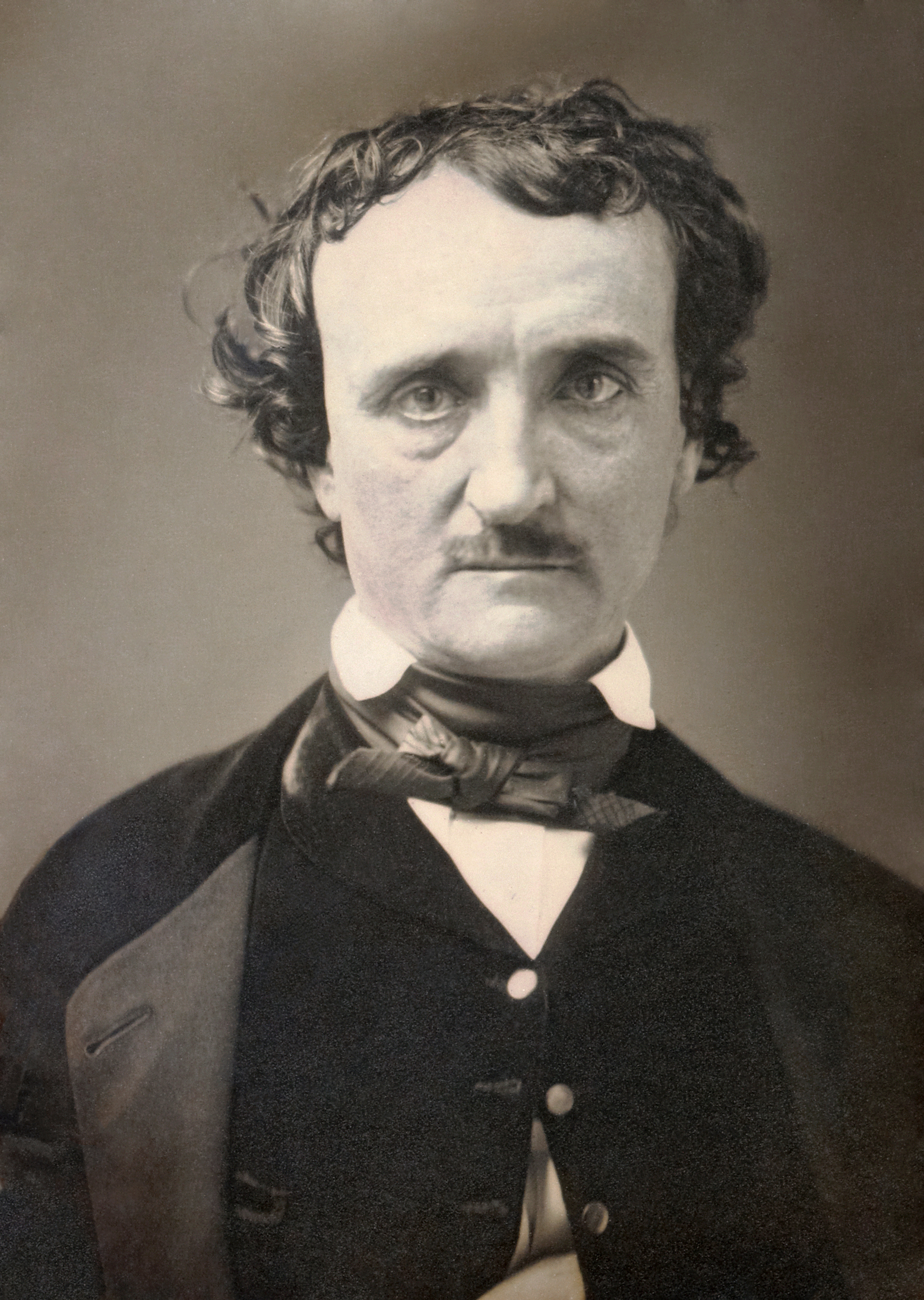„Nie w poznaniu jest szczęście, ale w poznawaniu.”
Not in knowledge is happiness, but in the acquisition of knowledge! (ang.)
Źródło: Potęga słowa
Edgar Allan Poe – amerykański poeta, nowelista, krytyk literacki i redaktor. Przedstawiciel romantyzmu w literaturze amerykańskiej. W jego twórczości dominowały wątki fantastyki i horroru. Zapoczątkował gatunek noweli kryminalnej . Stworzył także pierwszą w literaturze postać detektywa – C. Auguste’a Dupina.
Jego prozę charakteryzował silny psychologizm postaci oraz surrealistyczne, skrajnie brutalne opisy makabry, przywołujące na myśl stany epileptyczne czy upojenie alkoholowe. W twórczości Edgara Allana Poe odnaleźć można postawy choroby wieku – neurozy, świadomości dualizmu świata czy też bólu istnienia, które pod koniec XIX wieku stały się sztandarowymi pojęciami nowych nurtów sztuki: dekadentyzmu, ekspresjonizmu oraz symbolizmu.
Poe inspirował Baudelaire’a, Huysmansa, Dostojewskiego, Meyrinka, de Quinceya, Bierce'a, Lovecrafta, jak i całą rzeszę poetów surrealistycznych. Stephane Mallarme określił jego poemat Ulalume jako odbiegające od schematów swojej epoki arcydzieło poezji. Za jego przykładem szło wielu twórców, również polskich, np. Stefan Grabiński. Tadeusz Miciński wielokrotnie wspomina w swoich utworach inspirację fantastyczną wyobraźnią poety.
Zarówno poezję, jak i prozę Edgara Allana Poego tłumaczyło na polski wielu wybitnych literatów, jak np. Stanisław Wyrzykowski, Antoni Lange, Bolesław Leśmian, Tadeusz Miciński czy Zenon Przesmycki.
Twórczością Poego inspirowali się również filmowcy, tworząc mniej lub bardziej wierne ekranizacje jego opowiadań. Do najbardziej znanych dzieł filmowych należy nakręcony w latach 60. XX wieku cykl w reżyserii Rogera Cormana.
Mianem Edgarów nazywa się nagrody przyznawane przez organizację Mystery Writers of America.
Wikipedia

„Nie w poznaniu jest szczęście, ale w poznawaniu.”
Not in knowledge is happiness, but in the acquisition of knowledge! (ang.)
Źródło: Potęga słowa
Źródło: Ligeja, przeł. Stanisław Wyrzykowski
„Czas to pieniądz, a pieniądz to więcej niż czas.”
Time with me now, is money & money more than time. (ang.)
Men usually grow base by degrees. From me, in an instant, all virtue dropped bodily as a mantle. (ang.)
William Wilson
Źródło: Opowieści nadzwyczajne tom II, tłum. Bolesław Leśmian, wyd. Tow. Akc. S. Orgelbranda S-ów, 1913.
„Zawsze wierzyłem w głupców. Moi przyjaciele nazywają to wiarą w samego siebie.”
I have great faith in fools – self-confidence my friends will call it. (ang.)
Źródło: Marginalia w: The works of Edgar Allan Poe http://books.google.pl/books?id=an1KAAAAYAAJ, tom 3, Widdleton, 1849, s. 525.
„Ci, co śnią za dnia, wiedzą o wielu rzeczach niedostępnych dla tych, co śnią tylko nocą.”
They who dream by day are cognizant of many things which escape those who dream only by night. (ang.)
Źródło: Eleonora
„Jeśli chcesz od razu o czymś zapomnieć, zanotuj sobie, że to trzeba pamiętać.”
If you wish to forget anything on the spot, make a note that this thing is to be remembered. (ang.)
Źródło: Marginalia w: The works of Edgar Allan Poe http://books.google.pl/books?id=an1KAAAAYAAJ, tom 3, Widdleton, 1849, s. 483.
Quoth the Raven, „Nevermore!”
Inna wersja: Rzekł kruk na to: „Nigdy już!” (tłum. Zenon Przesmycki)
Źródło: Kruk, 1845
William Wilson
Źródło: Opowieści nadzwyczajne tom II, tłum. Bolesław Leśmian, wyd. Tow. Akc. S. Orgelbranda S-ów, 1913.
„Zazwyczaj ludzie podleją stopniowo.”
Źródło: Wielka księga mądrości, wybór Jacek i Tomasz Ilga
“Come! let the burial rite be read — the funeral song be sung!”
An anthem for the queenliest dead that ever died so young —
A dirge for her the doubly dead in that she died so young.
"Lenore", st. 1 (1831).
“For the love of God Montresor!”
"The Cask of Amontillado" (1846).
quit the bust above my door!
Take thy beak from out my heart, and take thy form from off my door!"
Quoth the Raven, "Nevermore."
Stanza 17.
The Raven (1844)
“There is no oath which seems to me so sacred as that sworn by the all-divine love I bear you.”
By this love, then, and by the God who reigns in Heaven, I swear to you that my soul is incapable of dishonor — that, with the exception of occasional follies and excesses which I bitterly lament, but to which I have been driven by intolerable sorrow, and which are hourly committed by others without attracting any notice whatever — I can call to mind no act of my life which would bring a blush to my cheek — or to yours. If I have erred at all, in this regard, it has been on the side of what the world would call a Quixotic sense of the honorable — of the chivalrous.
" Letter to Mrs. Whitman http://www.lfchosting.com/eapoe/WORKS/letters/p4810181.htm" (1848-10-18).
then let thy heart
From its present pathway part not!
Being everything which now thou art,
Be nothing which thou art not.
So with the world thy gentle ways,
Thy grace, thy more than beauty,
Shall be an endless theme of praise,
And love — a simple duty.
" To Frances S. Osgood http://www.readbookonline.net/readOnLine/595/" (1845).